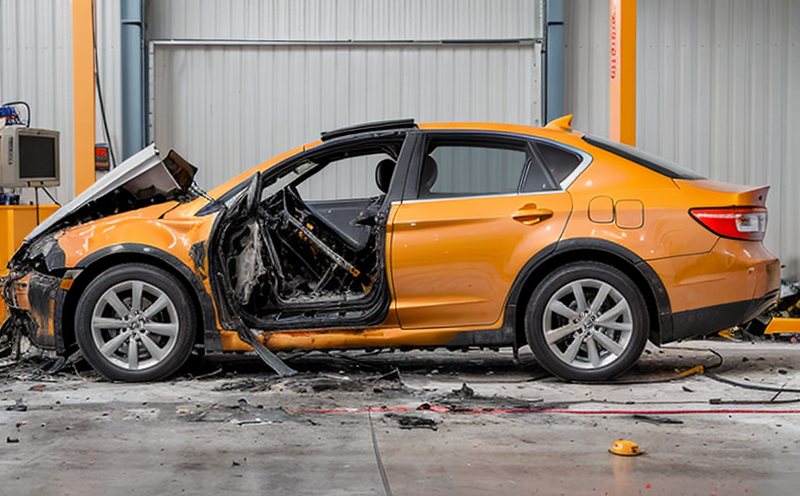IEC 62619 Mechanical Abuse and Crash Testing of Industrial Lithium-Ion Batteries
The IEC (International Electrotechnical Commission) standard, IEC 62619:2013, is a crucial document that addresses the mechanical abuse testing of lithium-ion batteries used in industrial applications. This standard ensures that these batteries are capable of withstanding various physical stresses and shocks without compromising their safety or performance. Lithium-ion batteries play a pivotal role across numerous industries, from automotive to renewable energy storage systems. Their reliability under harsh conditions is paramount for ensuring the safety and longevity of products.
The purpose behind IEC 62619 is to provide guidelines on how to test lithium-ion batteries to ensure they can survive in real-world scenarios such as drops, impacts, vibrations, thermal abuse, and other mechanical stresses. This testing ensures that when these batteries are installed in devices or systems, they will perform reliably and safely under anticipated conditions.
The standard covers several types of tests, including:
- Drop tests to evaluate the battery's resilience against falling from a certain height
- Vibration testing to simulate transportation or operation in environments with fluctuating motion
- Thermal abuse tests to assess performance after exposure to extreme temperatures
- Temperature cycling to check adaptability across wide temperature ranges
The testing process is designed to mimic real-world conditions, ensuring that the batteries are robust and safe for industrial applications. These tests help manufacturers identify potential weaknesses in battery design or manufacturing processes early on, allowing them to make improvements before the products reach the market.
During these tests, specific parameters such as impact force, acceleration, frequency of vibrations, and temperature ranges must be carefully controlled. The testing apparatus used is highly sophisticated and capable of replicating real-world conditions accurately.
The results of IEC 62619 mechanical abuse and crash testing are critical for quality managers, compliance officers, and R&D engineers as they provide a comprehensive understanding of the battery's performance under stress. This information ensures that products meet regulatory requirements and perform reliably in demanding environments. For procurement teams, this testing highlights the reliability of suppliers, ensuring that only high-quality batteries are used.
In summary, IEC 62619 provides a robust framework for ensuring the safety and performance of lithium-ion batteries under mechanical abuse conditions. This standard is essential for industries where battery reliability and safety are critical to product success.
Eurolab Advantages
At Eurolab, we understand the importance of IEC 62619 compliance in ensuring that industrial lithium-ion batteries perform reliably under mechanical abuse conditions. Here are some key advantages of choosing us for your testing needs:
- Expertise and Experience: Our team has extensive experience in battery testing, including the latest technologies and methodologies.
- State-of-the-Art Facilities: We have access to high-quality testing equipment that can replicate real-world conditions accurately.
- Certified Professionals: Our staff are trained according to international standards and are equipped with the latest knowledge in battery testing.
- Comprehensive Reporting: Eurolab provides detailed reports that not only document test results but also offer recommendations for improvement based on our findings.
We pride ourselves on offering a seamless, efficient service tailored to the unique needs of each client. Our goal is to provide you with accurate and reliable data that can be used to enhance product quality and safety.
Customer Impact and Satisfaction
- Enhanced Product Reliability: By ensuring compliance with IEC 62619, we help manufacturers achieve higher levels of product reliability, which ultimately leads to customer satisfaction.
- Regulatory Compliance: Our testing services ensure that your products meet all relevant regulatory requirements, reducing the risk of non-compliance issues and associated costs.
- Innovation Support: Through our detailed reports and recommendations, we assist in identifying areas for improvement, supporting continuous innovation within your organization.
- Cost Efficiency: By catching potential issues during testing rather than after product release, you can save on costly recalls and rework, leading to greater cost efficiency.
We are committed to providing top-tier service that meets the highest standards of quality and reliability. Our customers benefit not only from the results of our tests but also from the insights gained into improving their products' performance and safety.
Environmental and Sustainability Contributions
The testing services provided by Eurolab contribute significantly to environmental sustainability. By ensuring that industrial lithium-ion batteries meet stringent mechanical abuse standards, we help reduce the risk of product failures in harsh environments. This leads to fewer instances where batteries need replacement or recycling, thus minimizing waste.
Furthermore, our compliance with IEC 62619 ensures that products are safe and reliable under stress conditions, reducing the likelihood of accidents or malfunctions that could result in environmental damage. By supporting sustainable practices through rigorous testing, we play a vital role in promoting a safer and more environmentally friendly industrial sector.
Our commitment to sustainability is reflected not only in our services but also in our operational practices. We strive to minimize our own carbon footprint by using energy-efficient equipment and implementing recycling programs for test samples when appropriate.





